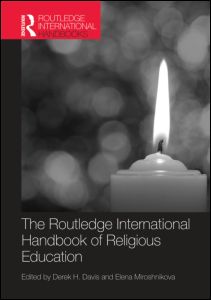The Routledge International Handbook of Religious Education

The Routledge International Handbook of Religious Education
Derek Davis and Elena Miroshnikova, eds.
(Foreword by W. Cole Durham, Jr.; chapter by Elizabeth A. Clark)
Routledge 2012
How and what to teach about religion is controversial in every country. The Routledge International Handbook of Religious Education is the first book to comprehensively address the range of ways that major countries around the world teach religion in public and private educational institutions. It discusses how three models in particular seem to dominate the landscape.
Countries with strong cultural traditions focused on a majority religion tend to adopt an “identification model,” where instruction is provided only in the tenets of the majority religion, often to the detriment of other religions and their adherents. Countries with traditions that differentiate church and state tend to adopt a “separation model,” thus either offering instruction in a wide range of religions, or in some cases teaching very little about religion, intentionally leaving it to religious institutions and the home setting to provide religious instruction. Still other countries attempt “managed pluralism,” in which neither one, nor many, but rather a limited handful of major religious traditions are taught. Inevitably, there are countries which do not fit any of these dominant models and the range of methods touched upon in this book will surprise even the most enlightened reader.
Religious instruction by educational institutions in 53 countries and regions of the world are explored by experts native to each country. These chapters discuss:
- Legal parameters in terms of subjective versus objective instruction in religion
- Constitutional, statutory, social and political contexts to religious approaches
- Distinctions between the kinds of instruction permitted in elementary and secondary schools versus what is allowed in institutions of higher learning.
- Regional assessments which provide a welcome overview and comparison.
This comprehensive and authoritative volume will appeal to educators, scholars, religious leaders, politicians, and others interested in how religion and education interface around the world.